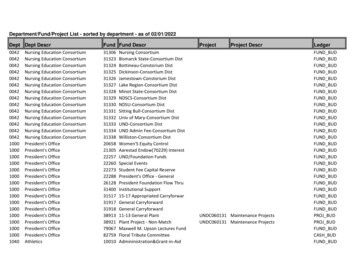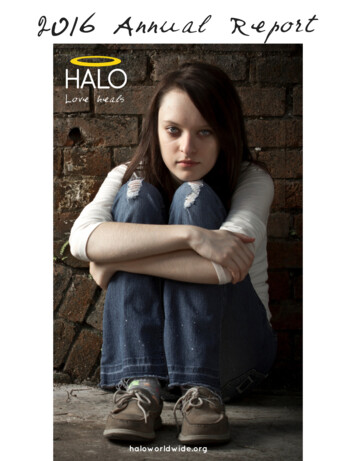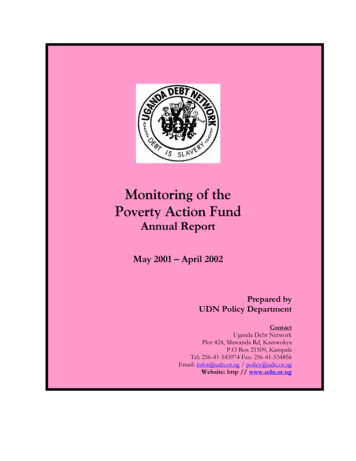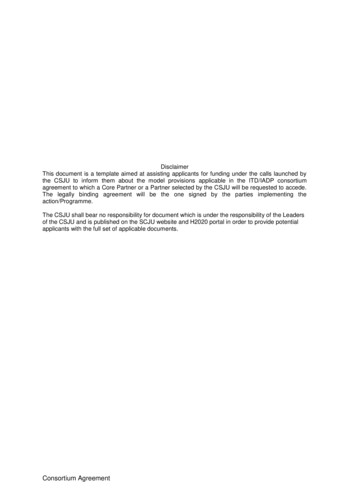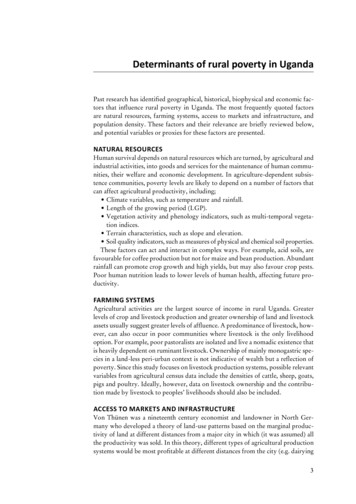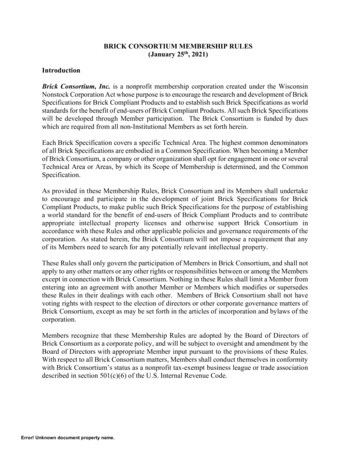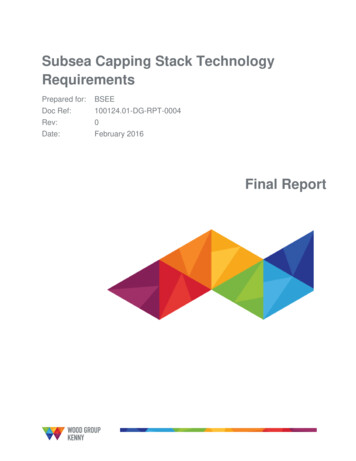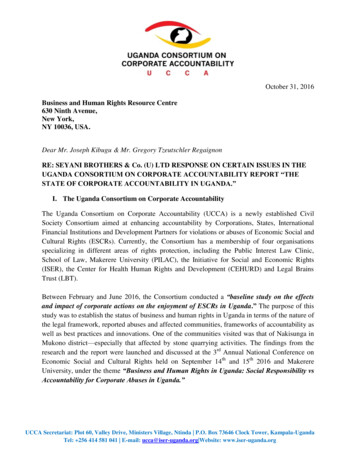
Transcription
October 31, 2016Business and Human Rights Resource Centre630 Ninth Avenue,New York,NY 10036, USA.Dear Mr. Joseph Kibugu & Mr. Gregory Tzeutschler RegaignonRE: SEYANI BROTHERS & Co. (U) LTD RESPONSE ON CERTAIN ISSUES IN THEUGANDA CONSORTIUM ON CORPORATE ACCOUNTABILITY REPORT “THESTATE OF CORPORATE ACCOUNTABILITY IN UGANDA.”I. The Uganda Consortium on Corporate AccountabilityThe Uganda Consortium on Corporate Accountability (UCCA) is a newly established CivilSociety Consortium aimed at enhancing accountability by Corporations, States, InternationalFinancial Institutions and Development Partners for violations or abuses of Economic Social andCultural Rights (ESCRs). Currently, the Consortium has a membership of four organisationsspecializing in different areas of rights protection, including the Public Interest Law Clinic,School of Law, Makerere University (PILAC), the Initiative for Social and Economic Rights(ISER), the Center for Health Human Rights and Development (CEHURD) and Legal BrainsTrust (LBT).Between February and June 2016, the Consortium conducted a “baseline study on the effectsand impact of corporate actions on the enjoyment of ESCRs in Uganda.” The purpose of thisstudy was to establish the status of business and human rights in Uganda in terms of the nature ofthe legal framework, reported abuses and affected communities, frameworks of accountability aswell as best practices and innovations. One of the communities visited was that of Nakisunga inMukono district—especially that affected by stone quarrying activities. The findings from theresearch and the report were launched and discussed at the 3rd Annual National Conference onEconomic Social and Cultural Rights held on September 14th and 15th 2016 and MakerereUniversity, under the theme “Business and Human Rights in Uganda: Social Responsibility vsAccountability for Corporate Abuses in Uganda.”UCCA Secretariat: Plot 60, Valley Drive, Ministers Village, Ntinda P.O. Box 73646 Clock Tower, Kampala-UgandaTel: 256 414 581 041 E-mail: ucca@iser-uganda.org Website: www.iser-uganda.org
II. AppreciationThank you for sharing the response from SEYANI BROTHERS & CO. (U) LTD (SEYANI) inregard to the section in the report that referenced their activities. We also thank SEYANI fortaking off time to compressively share their social responsibility endeavors—way beyond theissues noted in the report and also sharing their numerous engagements with the communityalbeit without a broader capture of the corporate accountability principles. In our perspective, theCompany response is a clear indication of the need to engage more in the area of corporateaccountability beyond mere voluntarism around corporate social responsibility (CSR). It is aperfect reflection of the issues that were broadly discussed at the just concluded 3rd AnnualNational Conference on Economic, Social and Cultural Rights that focused on Business andHuman Rights. The theme of the conference is very relevant to the SEYANI response. Nowherein the entire response, does the company mention nor acknowledge the existence of any form ofaccountability measures entrenched in our legal framework that corporations are bound torespect human rights.Whereas we appreciate the numerous social responsibility endeavors that that Company hasundertaken or promises to undertake in the communities where they operate, these do not negateits responsibility to respect constitutionally protected fundamental human rights.III. A Few ClarificationsBefore raising some issues we deem critical for the better appreciation of our work aroundcorporate accountability and the importance of the baseline study, we think it necessary toclarify a few issues from the SEYANI response.1. It is important to clarify that the UCCA report is a Baseline study intended toanalyze the status of corporate accountability in Uganda and was conducted toinform broader Consortium projects including later in-depth research arounddifferent thematic areas or sectors. This early step evaluation was intended to getclear benchmarks and indicators that will inform further research projects. As such,the study could not engage deeply in the numerous company/communityagreements and promises undertaken under corporate social responsibility.2. We also find it important to briefly address the SEYANI response suggesting theunprofessional working methods of our researchers in conducting the baseline,UCCA Secretariat: Plot 60, Valley Drive, Ministers Village, Ntinda P.O. Box 73646 Clock Tower, Kampala-UgandaTel: 256 414 581 041 E-mail: ucca@iser-uganda.org Website: www.iser-uganda.org
especially as it represents them. They further question whether the researchersindeed visited the Company quarrying site on March 24, 2016 and the lack of effortto reach company officials. It is our honest opinion that any officer stationed at aquarrying site supervising the daily operations should be able to speak on issues thatare not administrative in nature but affect the employees and the communitiesaround.3. Sempape Memorial Primary School: The SEYANI response attributes the report tohave placed the primary school near their quarrying site. However, the discussionabout the school on Page 67 of the report clearly references the school in proximityto another quarrying company Tong Da China International and not SeyaniBrothers.4. Complaints and Petitions: In our report, we categorically note that the labour officein mukono has never received any complaints about Seyani Brothers. In ourdiscussion with the office, the labour officer acknowledged that they have alsonever visited the quarrying site. This however, does not prove a lack of abuses ofhuman rights. There have been petitions and a high court suit against NEMA andSEYANI Brothers. It is not clear why the SEYANI response doesn’t make mentionof any of these and only paints a clean picture with no community complaintswhatsoever. (The complaints are attached)5. Research Purpose: The SEYANI response found it ‘alarming’ that our researchteam did not dig deep into the access to health challenges being faced by thecommunity. We need to clarify that there are different types of research and fordifferent purposes. As noted in the beginning, ours was a baseline study on theeffects and impact of corporate actions on human rights. This doesn’t mean thathealth issues are not a problem that requires further research, but unfortunately thatwas not what we set out to do and we could not turn to it simply because it is animportant issue to SEYANI. Delivery of health services in Uganda is the mandateof the government and even where non-state actors come up with additionalmeasures to supplement the sector, their services do not make up for the violationsand abuse of human rights that may arise in the implementation of their activities.UCCA Secretariat: Plot 60, Valley Drive, Ministers Village, Ntinda P.O. Box 73646 Clock Tower, Kampala-UgandaTel: 256 414 581 041 E-mail: ucca@iser-uganda.org Website: www.iser-uganda.org
IV. OTHER KEY ISSUES1. The Field Research & Community EngagementThe team of researchers that visited Nakisunga in Mukono first had a meeting at the localgovernment office with the Labour Office and the Chief Administrative Officer who bothacknowledged some of the challenges faced by the communities around the quarrying areas. (SeeAttachmed CAO Letter) The team proceeded to the quarrying site accompanied by a member ofthe local community. As noted in the report, the SEYANI employee, supervising the sitedeclined to speak to us and requested one of the workers to attend to us. We were left to have adiscussion with the gentleman and then proceeded to speak with the community membersresident around the quarrying site. There were attempts to contact the main office andunfortunately letters requesting for an appointment went unanswered.A validation workshop was later conducted in June and an invitation was also extended toSEYANI but no representative attended. Community members from Mukono again participatedin the validation workshop and reinforced the issues that were highlighted during the fieldmission. The UCCA later in October organized another community dialogue in the area and thiswas attended by the LC 5 chairman of the area, LC 3 and the Speaker of the Mukono Localgovernment. The same issues were interrogated and whereas there were clear evidence of socialresponsibility engagements, there were frustrations within the community members about thelack of corporate accountability regarding the negative impacts of the stone quarry activities. Infact the community members largely castigated their local leaders for failing to address the issuesas have been raised for years since the start of the quarrying. The community shared theirpetitions to parliament and the Ministry of Water and Environment on the matter, and theirjudicial attempt to seek remedy in the suit against SEYANI and NEMA. They also shared a letterthey wrote to the Director of SEYANI on the matters. (See Attachments)2. The UN Protect, Respect and Remedy FrameworkSince 1990, the debate concerning the responsibilities of businesses in relation to human rightshas been a prominent one on the global agenda. There was extensive research and consultationswith governments, business and civil societies from five continents led by Prof. John Ruggie thatled to the adoption of the UN Guiding Principles on Business and Human Rights in 2008. TheseUCCA Secretariat: Plot 60, Valley Drive, Ministers Village, Ntinda P.O. Box 73646 Clock Tower, Kampala-UgandaTel: 256 414 581 041 E-mail: ucca@iser-uganda.org Website: www.iser-uganda.org
principles which are commonly referred to as the UN Protect, Respect and Remedy Frameworkhave been instrumental in the global discussion around corporate accountability.a. The Corporate Responsibility to RESPECTOne of the three pillars of the UN Protect, Respect and Remedy Framework is the corporateresponsibility to respect human rights, which entails acting with due diligence to avoid infringingon the rights of others and to address adverse impacts that may occur in the implementation oftheir activities. The other two are the state duty to protect against human rights abuses by thirdparties, including business entities, through appropriate policies, regulation, and adjudication;and ensuring access by victims to effective remedy both judicial and non-judicial.Both national and international standards agree that business entities have a duty to respecthuman rights irrespective of where they operate or even in absence of concrete state mechanismto protect. This is largely due to the fact that corporate related abuse of human rights occursmostly in weak governance countries—with weak policy and legal frameworks. As noted bySEYANI, and reinforced in the UCCA Report, the law governing corporate accountability isweak both in design and implementation. Respect for fundamental human rights is one areacompanies have failed to adhere to and in certain instances with complicity of the state. Theincreasing corporate capture in the country has triggered high levels of displacement, neglect forfree prior and informed consent principles, land acquisition conflicts, community resettlementand relocation irregularities, environmental degradation and violation of the right to live in a safeand healthy environment. Some companies fail to secure the ‘social license to operate’ andtherefore rely on private security firms to ensure physical and business safety. Similarly, thislack of social license and adherence to accountability principles is normally traded off by avibrant social responsibility machinery which stifles communities abilities to enforce their rights.3. Corporate Social Responsibility vs. Corporate AccountabilityThe concept of corporate social responsibility vis-à-vis corporate accountability is of greatinterest to the Consortium and one that will largely require unpacking in our engagements withdifferent corporations to enhance its appreciation in implementation of different activities. Asnoted in the Preface to the UCCA Report, understanding of ‘corporate social responsibility(CSR)’ as a phrase has come to be synonymous with corporations engaging with thecommunities in which they operate, usually connoting charitable acts. From the SEYANIresponse, this is an area within which they present in-depth engagement with the communities.UCCA Secretariat: Plot 60, Valley Drive, Ministers Village, Ntinda P.O. Box 73646 Clock Tower, Kampala-UgandaTel: 256 414 581 041 E-mail: ucca@iser-uganda.org Website: www.iser-uganda.org
However, CSR is a voluntary mechanism geared at giving back to the community throughaddressing key community needs in health, education or infrastructural challenges as SEYANInotes. Nevertheless, CSR lacks the binding element of corporate accountability as envisaged inboth the domestic and international legal frameworks. To ensure the protection of, and respectfor, human rights by business and corporations, accountability must go beyond voluntarism. It isincreasingly necessary to recognise that both corporate responsibility and accountability areessential elements and key drivers to ensure economic and sustainable development.As evidenced in the SEYANI response, the company has done and also promises to do morearound corporate social responsibility, however, the same cannot be said on the subject ofcorporate accountability, a notion that the baseline study found much lacking in most areas theUCCA team visited. The main aim of the UCCA baseline study was not to focus on the subjectof CSR or as SEYANI faults our team, the ‘alarming failure’ to research on the lack of access tohealth services in the Nakisunga community and highlighting what SEYANI has done to addressthis. The baseline study was focused on exploring the notion of corporate accountability inUganda—especially as it relates to the applicable legal, policy and regulatory framework. It wastailored to look into the impact of corporations on the rights of communities and the variousefforts by state agencies, CSOs and corporations to promote corporate accountability in areas ofoperation.SEYANI as a company has no legal obligation to address the access to health challenges faced inthe community. That is government responsibility, although Seyani can rightfully supplement thegovernment services. Whatever voluntary undertakings they enter to build health centres, financesurgical operations, offer scholarships and construct water sources to ease the access to health,education and other livelihood needs in the community, do not expunge them from their overallresponsibility of respecting fundamental human rights.The report acknowledges both the negative and positive impact of corporations on poorcommunities. But we reiterate, positive engagements around CSR should never negate thecorporate responsibility to respect human rights and ensure that where there are violations, thereare effective remedies in place. As noted in the baseline report and quite evidenced in theSEYANI response, there is a lot of reliance by corporate entities on corporate socialresponsibility and other voluntary codes of conduct as a tradeoff for the negative impacts of theirbusinesses on communities. Notwithstanding the positive impact of the company, the issuesraised by the Nakisunga community, ranging from noise pollution, dust emissions, destruction ofUCCA Secretariat: Plot 60, Valley Drive, Ministers Village, Ntinda P.O. Box 73646 Clock Tower, Kampala-UgandaTel: 256 414 581 041 E-mail: ucca@iser-uganda.org Website: www.iser-uganda.org
properties, loss of rental income, inconvenienced standards of living and the health risks arisingcannot all be negated by the mere CSR engagements of the company. There is need to movebeyond voluntarism showcased in CSR engagements and demand for accountability forcorporate abuses. Accountability for corporate actions should not be avoided by the mereexistence of voluntary CSR actions.V. ConclusionAll in all, we reiterate that corporate social responsibility is important but it cannot be used as atradeoff against corporate accountability. Article 20 (2) of the 1995 Uganda constitution enjoinsthe state to ensure that non-state actors respect human rights. As the Uganda Consortium onCorporate Accountability we do appreciate and encourage any CSR principles by corporations tobetter the lives of the communities in which they operate. However, this should never be anundertaking to expunge their corporate accountability responsibilities.We appreciate the different measures SEYANI Brothers has employed to address some issuesand welcome any engagements we can have to address some of the community complaints andto enhance their appreciation of corporate accountability. The Consortium is also willing tofacilitate further dialogue between the company and the community. We look forward toworking with SEYANI as with other corporations in Uganda to ensure that businesses operate inan environment that not only promotes but also respects fundamental human rights.Thank you,Yours TrulyArnold KwesigaProject CoordinatorUganda Consortium on Corporate Accountability.UCCA Secretariat: Plot 60, Valley Drive, Ministers Village, Ntinda P.O. Box 73646 Clock Tower, Kampala-UgandaTel: 256 414 581 041 E-mail: ucca@iser-uganda.org Website: www.iser-uganda.org
The Uganda Consortium on Corporate Accountability The Uganda Consortium on Corporate Accountability (UCCA) is a newly established Civil . the legal framework, reported abuses and affected communities, frameworks of accountability as . quarrying site supervising the daily operations should be able to speak on issues that
